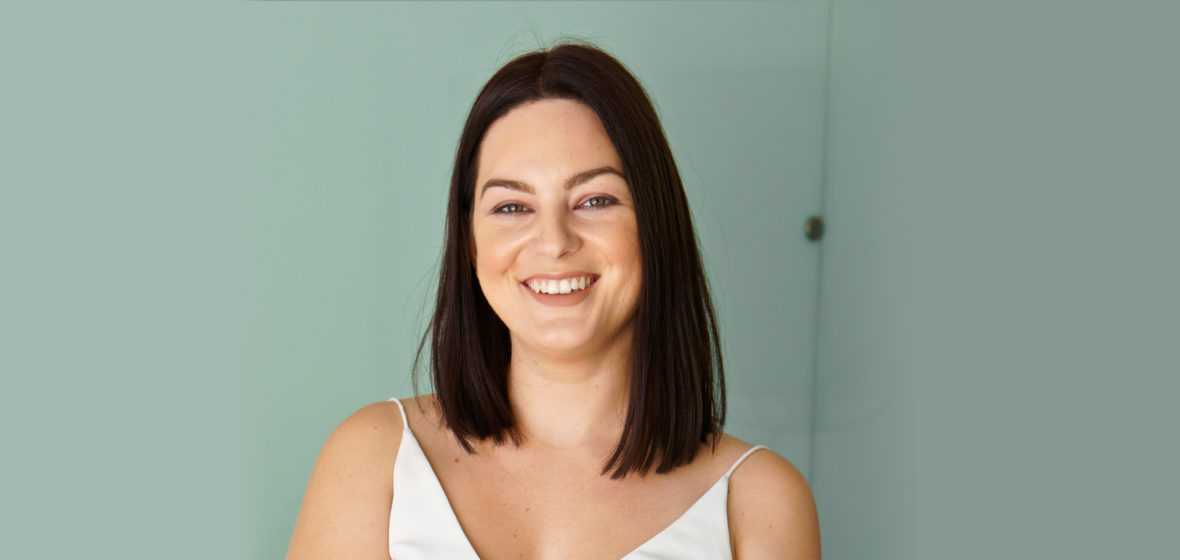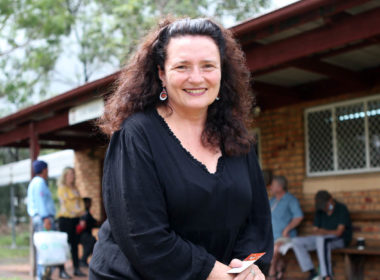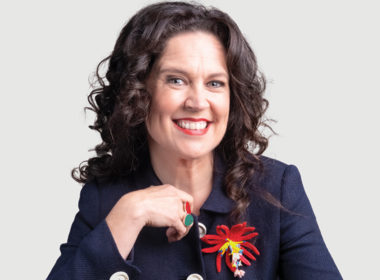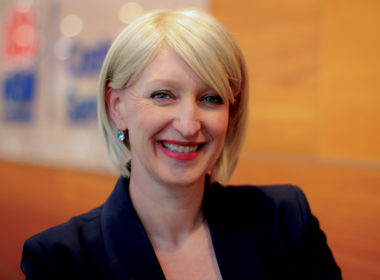Courtney Bowie, founder and CEO of Her Lawyer, is doing her part to create a world where law firms care more about tackling gender discrimination, innovation and mental health than billable hours. The award-winning business owner and mother speaks candidly with LSJ about having the courage to be vulnerable in the legal profession.
Courtney Bowie knows how to chart her own course. She says if most of the legal profession is on a desert island, then she is on a boat in the middle of the ocean doing a “one arm fan dance”.
“I’m sure there is a biological, evolutionary reason for this but [law] is this profession where everyone bands together and we tell each other to stay where it’s safe,” Bowie says.
Bowie dove into the promising waters of legal innovation in 2017, launching the first commercial law firm in Australia to be both female-focused and 100 per cent virtual. Her Lawyer was born out of a desire to empower businesswomen to seek legal advice, with everything from the firm’s communication style to service design tailored specifically for women.
After the high-pressure nature of a “traditional law firm” caused Bowie chronic stress, anxiety and depression, she was committed to creating a flexible and supportive workplace for her own employees.
But like many professionals during the COVID-19 pandemic, Bowie says her purpose became lost in a sea of uncertainty and confusion. What is my place? Can I make real change if I keep going on this trajectory?
“I knew something needed to change. … I needed to come back to centre. You have to help yourself in order to help other people.”
Towards the end of 2021 when the pandemic reared itself sharply, Bowie found herself back in the “burnout zone” with no boundaries between where her business ended, and she began.
She describes her mindset during this time as “self-limiting”, plagued by small thoughts where her confidence as a leader and innovator was questioned.
“I knew something needed to change. I had done the ‘start up thing’ of saying yes to everything and figuring it out later. But the world was upside down and there were too many balls in the air. I needed to come back to centre. You have to help yourself in order to help other people,” Bowie tells LSJ.
“Innovating when things are stable is a positive choice you make. You are in control because you can say yes or no. But when you are trying to innovate in a world that is shifting sand, that becomes a different proposition because not only are you taking yourself on a journey that is uncertain, you don’t have a stable place to come back to.
“That shook me up more than I thought at the start of the pandemic.”
It is uncommon for leaders to talk openly about this process. But now having come out the other side, Bowie wants to use her experience and skills to reimagine Her Lawyer’s niche, team structure and the legal services they offer to be more relevant in a post-pandemic word.
A quote that has stayed front of mind for Bowie in this new mind-mapping phase is: “What would you do if you could not fail?”
Aside from mildly contemplating changing tack altogether for a career as a macramé textile artist, she jokes, Bowie imagines her business taking the form of a multi-disciplinary practice that would serve as a megaphone for change for women’s legal issues and challenges in society more broadly.
“Law is just part of a business journey. It’s often that real negative prevention part. How do we fit within the broader ecosystem of services that business owners need to be successful? Does that look like a multi-disciplinary practice? Does that look like better developed referral relationships? What does that mean in terms of physical space and is that important? Lots to consider,” Bowie says, grinning with excitement at the possibilities for Her Lawyer.
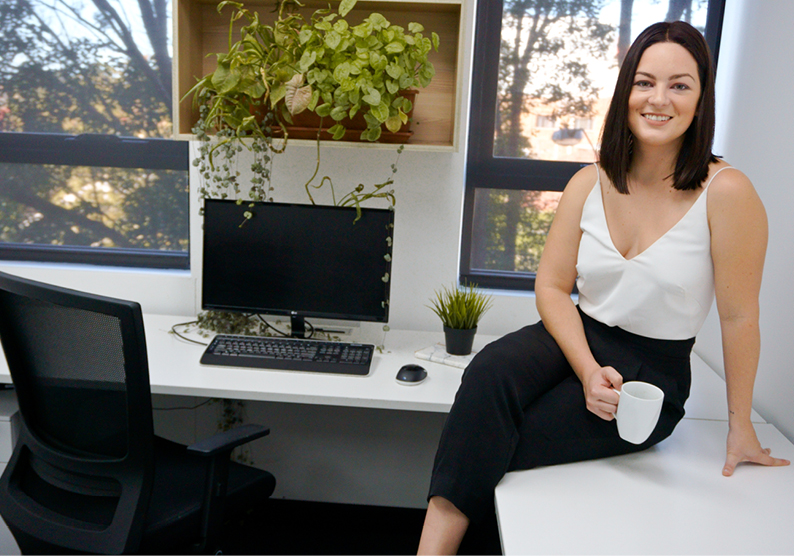
“If I had a blank cheque, I would start a ‘Women’s Liberation Legal Lab’. I would get together senior lawyers with innovative mindsets, futurists, creatives, technologists, data scientists and start working on solutions to problems that could be seen as legal. Like inherent gender bias, problems with reporting of sexual assault, gender discrimination,” Bowie says.
But recruiting said female senior lawyers, Bowie says, will be a challenge. Although female solicitors continue to dominate the legal profession in every state and territory in Australia, men are still disproportionately represented in senior leadership positions, holding twice as many principal of law practising certificates as women.
78 per cent of solicitors aged between 65 and 69 are men. In contrast, 70 per cent below the age of 24 are women.
“I’ve been thinking about that team structure. The senior lawyer problem is really challenging. How do you attract them? How do you not only attract a senior lawyer but one that is passionate about gender equality, mental health and is happy to play at the frontier of innovation?” Bowie says.
“If we’ve got all the women leaving the profession and none of them making it up to the senior ranks, how are we going to have any change? The conditions are not right for women to rise.”
Although hybrid working arrangements are a positive step forward for professional women juggling their careers and family lives, Bowie says it brings into question the notion of “visibility” when aiming for a promotion now that firms have started returning to offices.
“I’m not saying [hybrid working] is easy to get right because you are looking at profitability, productivity, cultural issues as well as diversity and discrimination.”
“It can’t be, for example: ‘Sue works from home on Tuesdays, but no one remembers. Sue never gets invited to mixers, Sue never gets promoted or given a bonus or invited to meet clients. I don’t want to see that,” Bowie explains.
“It needs to be that hybrid working is encouraged because we know the benefits it has for our firms, for our staff and our clients. I’m not saying it’s easy to get right because you are looking at profitability, productivity, cultural issues as well as diversity and discrimination. It’s hard but if they can do it, they will be the law firms of the future.
“It’s all well and good for me to talk about it, but I’m not there presenting the business case to the partners.”
During our lunch at a bustling inner-city restaurant, Bowie tells me about a moment that stuck with her from a few weeks prior, when she was giving a speech to a group of high school students for International Women’s Day.
As she was telling the students about her journey from a career in a prestigious Sydney law firm to starting her own business, one of the girls raised her hand and asked what hope for change their generation of women has?
“Lots of women experience gender discrimination, sexual harassment and being overlooked. Having clients say to you ‘You’re my lawyer? You’re young enough to be my daughter’. We are working so hard to make a difference, but the next generations are probably going to have the same problems because we are not moving fast enough.”
Bowie says this reality stoked a fire within her that had been dulled by the chaos and turmoil of the past few years. Now, she is determined to reclaim her bearing, aiming directly at community action and setting standards for firms to follow. Being part of the case for change.
“Once you strip all the noise away and ask yourself what actions you are going to take to make a real difference to someone else’s life, for that girl in the high school listening to me speak. Focus on that, forget everything else.”

